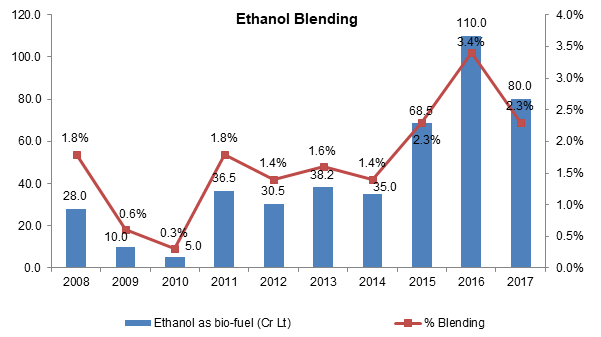India’s Ethanol Plan and Food Security
Figure 4: No Copyright Infringement Intended
Context:
- India’s ambitious plan to cut the use offossil fuels by promoting ethanol derived from rice, corn and sugar could undermineits food security.
About:
- Ethanol: It is an agro-based product, mainly produced from a by-product of the sugar industry, namely molasses.
- It is one of the principal biofuels, which is naturally produced by the fermentation of sugars by yeasts or via petrochemical processes such as ethylene hydration.
- Ethanol Blending Programme(EBP): It aims at blending ethanol with petrol, thereby bringing it under the category of biofuels and saving millions of dollars by cutting fuel imports and decreasing carbon emissions.
- Blending Target: The Government of India has advanced the target for 20% ethanol blending in petrol (also called E20) to 2025 from 2030.
- Currently, 8.5% of ethanol is blended with petrol in India.
Issues
- National Policy on Biofuel: The new ethanol blending target primarily focuses on food based feedstocks, in light of grain surpluses and wide availability of technologies.
- The blueprint is a departure from the 2018 National Policy on Biofuels, which prioritized grasses and algae; cellulosic material such as bagasse, farm and forestry residue; and, items like straw from rice, wheat and corn.
- Risk of Hunger: The food grains meant for the impoverished are being sold to distilleries at prices cheaper than what states pay for their public distribution networks.
- Competition between the distilleries and the public distribution system for subsidized food grains could have adverse consequences for the rural poor and expose them to enhanced risk of hunger.
- India still ranks 94th on the Global Hunger Index 2020 comprising 107 nations.
- The Food and Agriculture Organization (FAO) estimates that about 209 million Indians, or about 15% of its population, were undernourished between 2018 and 2020.
- The Covid-19 pandemic is also pushing more people into poverty, dealing a blow to decades of progress.
- Cost: Production of biofuels requires land, this impacts the cost of biofuels as well as that of food crops.
- Water use: Massive quantities of water are required for proper irrigation of biofuel crops as well as to manufacture the fuel, which could strain local and regional water resources.
- Efficiency: Fossil Fuels produce more energy than some of the biofuels. E.g. 1 gallon of ethanol produces less energy as compared to 1 gallon of gasoline (a fossil fuel).
Arguments in Favor:
- Enough Stockpiles of Grains: The push for ethanol poses no threat to India’s food security because the government has enough stockpiles of grains at warehouses of the state-run Food Corporation of India (FCI).
- State reserves stood at 21.8 million tons of rice, against a requirement of 13.54 million tons.
- Capacity Creation: The long-term planning of the government involves the creation of sufficient capacities so that half of the requirement of 20% blending is catered by grains, predominantly maize and the rest by sugar cane.
- Benefit of Farmers: The blending plan would benefit corn and rice farmers, while addressing the issue of Surplus.
Way Forward
- Ethanol From Wastes: India has a real opportunity here to become a global leader in sustainable biofuels policy if it chooses to refocus on ethanol made from wastes.
- This would bring both strong climate and air quality benefits, since these wastes are currently often burned, contributing to smog.
- Water Crisis: The new ethanol policy should ensure that it doesn’t drive farmers toward water-intensive crops and create a water crisis in a country where its shortage is already acute.
- Rice and sugarcane, along with wheat, consume about 80% of India’s irrigation water.
- Prioritize Crop Production: With our depleting groundwater resources, arable land constraints, erratic monsoons, and dropping crop yields due to climate change, food production must be prioritized over cropsforfuel.




1.png)
